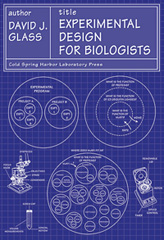
|
David J. Glass, M.D.:
Experimental Design for Biologists
Preis:
€ 15,00
Einband: Hardcover
Auflage: 1. Edition
Verlag: Cold Spring Harbor Laboratory Press
Erscheinungsdatum: 01/2007
Seiten: 206 pp.
Abbildungen: illus., index
ISBN-10: 0-87969-735-0
ISBN-13: 978-087969735-8
|
Weitere Fachbücher aus dem Fachgebiet:
Zell- und Molekularbiologie |
Weitere Titelinformationen:
|
|
Probekapitel öffnen [.pdf - ca. 415 kb]| Probekapitel öffnen [.pdf - ca. 415 kb]|
|
| zurück |
Beschreibung
The effective design of scientific experiments is critical to success, yet graduate students receive very little formal training in how to do it. Based on a well–received course taught by the author, Experimental Design for Biologists fills this gap.
Experimental Design for Biologists explains how to establish the framework for an experimental project, how to set up a system, design experiments within that system, and how to determine and use the correct set of controls. Separate chapters are devoted to negative controls, positive controls, and other categories of controls that are perhaps less recognized, such as “assumption controls,” and “experimentalist controls.” Furthermore, there are sections on establishing the experimental system, which include performing critical “system controls.”
Should all experimental plans be hypothesis–driven? Is a question/answer approach more appropriate? What was the hypothesis behind the Human Genome Project? What color is the sky? How does one get to Carnegie Hall? The answers to these kinds of questions can be found in Experimental Design for Biologists. Written in an engaging manner, the book provides compelling lessons in framing an experimental question, establishing a validated system to answer the question, and deriving verifiable models from experimental data. Experimental Design for Biologists is an essential source of theory and practical guidance in designing a research plan.
|
|
Inhalt
Preface
1. Defining the Experimental Program
2. The Hypothesis as a Framework for Scientific Projects: Is Critical Rationalism Critical?
3. Scientific Settings Where a Hypothesis is Not Practical
4. The Problem/Question as a Framework for Scientific Projects: An Invitation for Inductive Reasoning
5. What Constitutes an Acceptable Answer to an Experimental Question?
6. How Experimental Conclusions are Used to Represent Reality: Model Building
7. Establishing a System for Experimentation
8. Designing the Experiment: Definitions, Time Courses, and Experimental Repeats
9. Validating a Model: The Ability to Predict the Future
10. Designing the Experimental Project: A Biological Example
11. Experimental Repetition: The Process of Acquiring Data to Model Future Outcomes
12. The Requirement for the Negative Control
13. The Requirement for the Positive Control
14. Method and Reagent Controls
15. Subject Controls
16. Assumption Controls
17. Experimentalist Controls: Establishing a Claim to an Objective Perspective
18. A Description of Biological Empiricism
19. A Short Synopsis
Index
Vorteile
The effective design of scientific experiments is critical to success, yet graduate students receive very little formal training in how to do it. Based on a well–received course taught by the author, experimental Design for Biologists fills this gap.
Experimental Design for Biologists explains how to establish the framework for an experimentalproject, how to set up a system, design experiments within that system, and how to determineand use the correct set of controls. Separate chapters are devoted to negative controls, positivecontrols, and other categories of controls that are perhaps less recognized, such as “assumptioncontrols,” and “experimentalist controls.” Furthermore, there are sections on establishing theexperimental system, which include performing critical “system controls.”
Autoreninfo
David J. Glass, M.D., Novartis Institutes for Biomedical Research, Cambridge, Massachusetts
|
|






 CRISPR-Cas:
CRISPR-Cas: Budding Yeast
Budding Yeast Learning and Memory
Learning and Memory Conservation Science: Balancing the Needs of People and Nature
Conservation Science: Balancing the Needs of People and Nature Introduction to Optical Microscopy
Introduction to Optical Microscopy Organic Chemistry
Organic Chemistry CURRENT PROTOCOLS Wiley USA
CURRENT PROTOCOLS Wiley USA